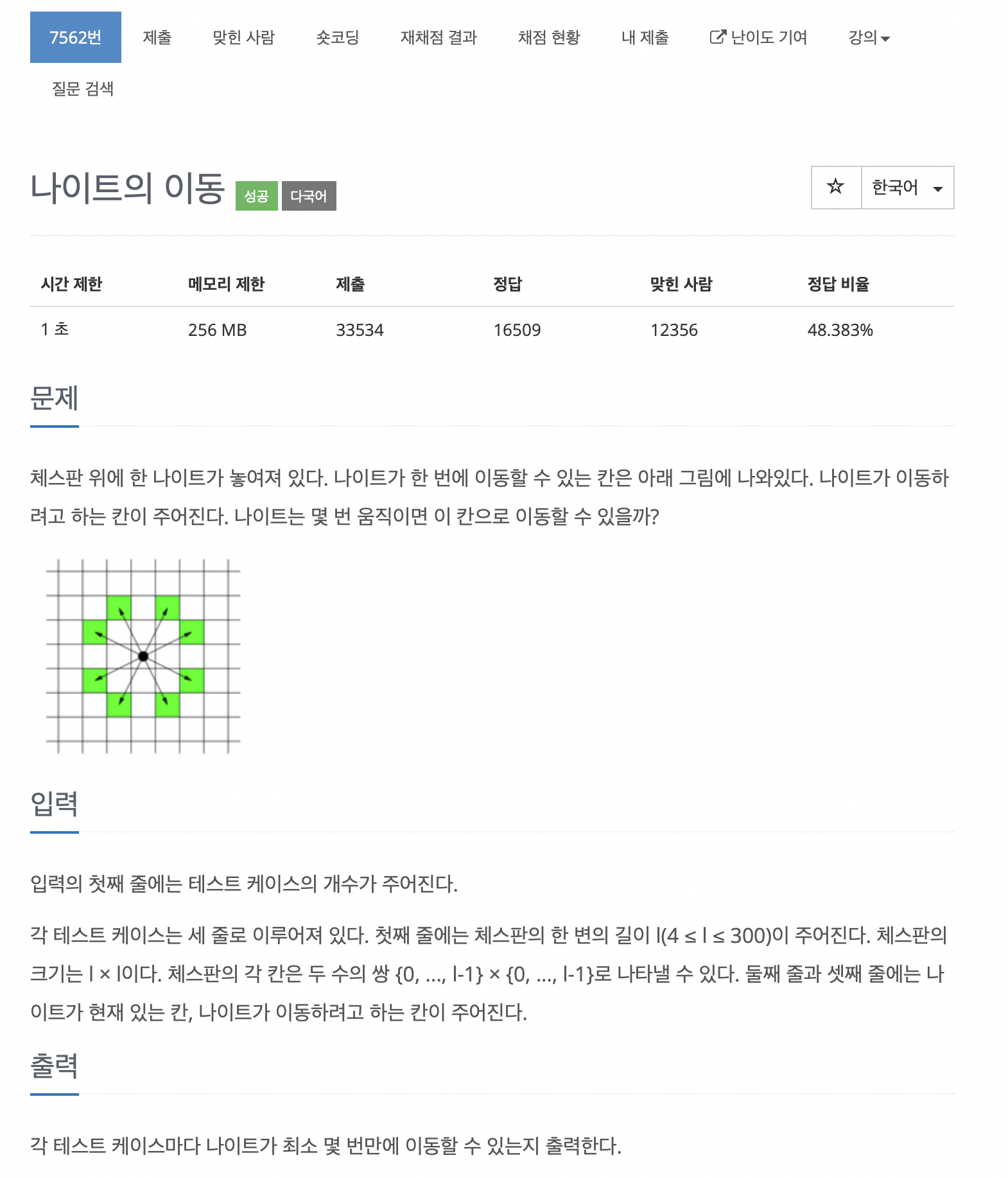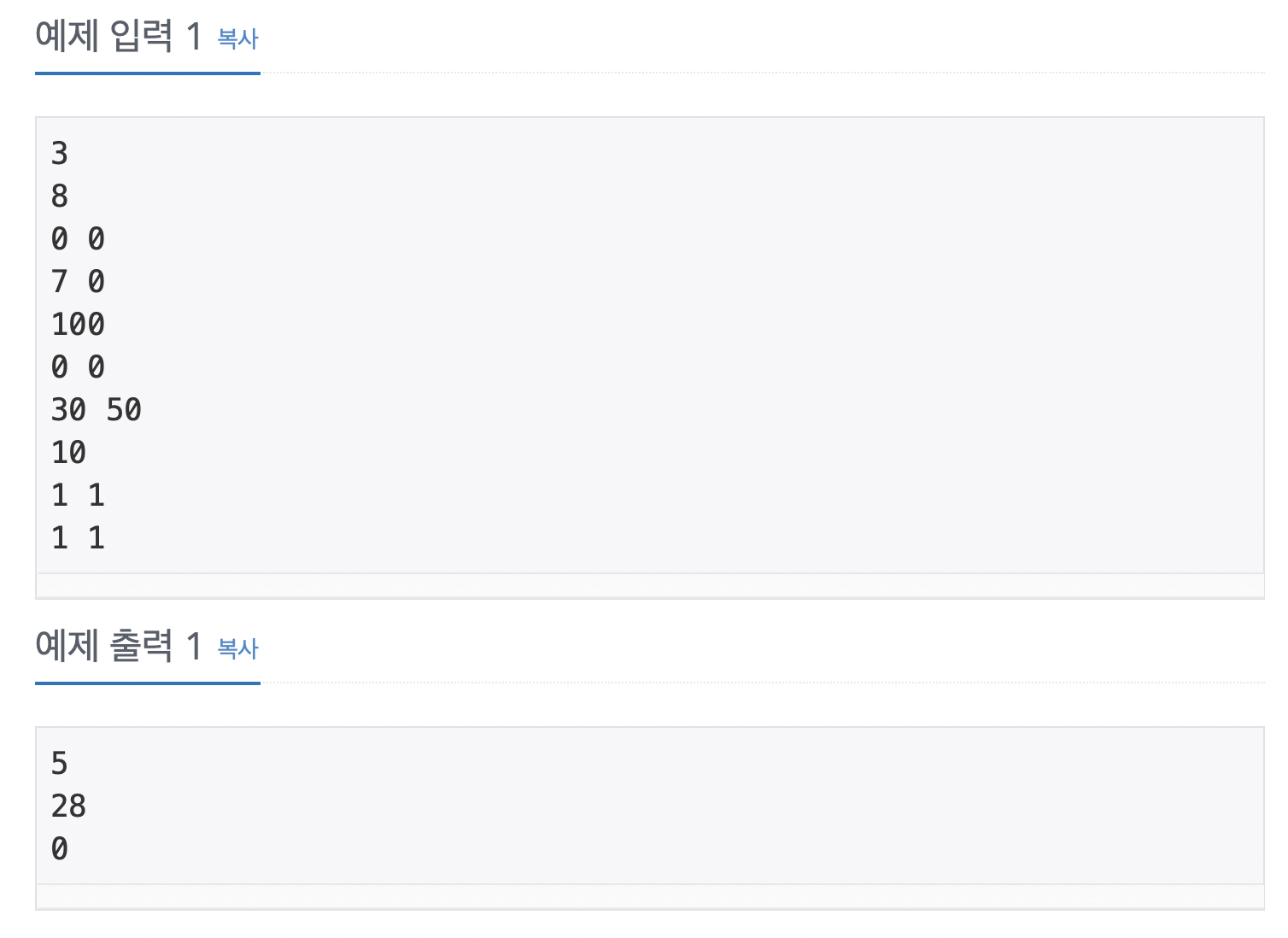
문제는 다음과 같습니다.


너무나도 전형적인 bfs문제이구요,
stl queue 자료구조를 이용하였고,
시작점을 먼저 큐에 넣고 이후에 bfs를 진행하였습니다.
갈 수 있는 방향은 총 8개이고,
갈 수 있는 방향이 해당 범위에 만족하면 이를 큐에 넣어서 계속 진행하도록 하였습니다.
그리고 가장 먼저(최소한의 이동으로) 도착점에 도착한 것이 답이 되므로,
이때 바로 bfs에서 탈출하여 정답을 출력하도록 했습니다.
전체 코드는 다음과 같습니다.
#include <bits/stdc++.h>
using namespace std;
int main() {
ios_base::sync_with_stdio(false);
cin.tie(nullptr);
int c, l; cin>>c;
while(c--){
cin>>l; // 체스판 한한 변의 길이
int ch[302][302]={0, };
queue<pair<pair<int, int>, int>> q;
int s1, s2, f1, f2; cin>>s1>>s2>>f1>>f2;
s1++; s2++; f1++; f2++; // 양변 테두리 맞추기
int res=0;
ch[s1][s2]=1;
q.push({{s1, s2}, res});
// bfs 수행
while(!q.empty()){
pair<pair<int, int>, int> p = q.front(); q.pop();
int i = p.first.first; int j = p.first.second;
res = p.second;
if(i==f1 && j==f2) break;
if(ch[i-1][j-2]==0 && i-1>=1 && j-2>=1){
ch[i-1][j-2]=1; q.push({{i-1, j-2}, res+1});
}
if(ch[i-2][j-1]==0 && i-2>=1 && j-1>=1){
ch[i-2][j-1]=1; q.push({{i-2, j-1}, res+1});
}
if(ch[i-2][j+1]==0 && i-2>=1 && j+1<=l){
ch[i-2][j+1]=1; q.push({{i-2, j+1}, res+1});
}
if(ch[i-1][j+2]==0 && i-1>=1 && j+2<=l){
ch[i-1][j+2]=1; q.push({{i-1, j+2}, res+1});
}
if(ch[i+1][j+2]==0 && i+1<=l && j+2<=l){
ch[i+1][j+2]=1; q.push({{i+1, j+2}, res+1});
}
if(ch[i+2][j+1]==0 && i+2<=l && j+1<=l){
ch[i+2][j+1]=1; q.push({{i+2, j+1}, res+1});
}
if(ch[i+2][j-1]==0 && i+2<=l && j-1>=1){
ch[i+2][j-1]=1; q.push({{i+2, j-1}, res+1});
}
if(ch[i+1][j-2]==0 && i+1<=l && j-2>=1){
ch[i+1][j-2]=1; q.push({{i+1, j-2}, res+1});
}
} // bfs 끝
cout<<res<<"\n";
} // while문 끝
return 0;
}2/19 토요일 복습)
#include <bits/stdc++.h>
using namespace std;
int main() {
ios_base::sync_with_stdio(false);
cin.tie(nullptr);
int n, m, t, d; cin>>t;
while(t--){
queue<pair<pair<int, int>, int>> q;
int a[302][302]={0, }; int ch[302][302]={0, };
cin>>n;
int s1, s2; cin>>s1>>s2; // 시작점 입력
int e1, e2; cin>>e1>>e2; // 도착점 입력
ch[s1][s2]=1; q.push({{s1, s2}, 0});
while(!q.empty()){
pair<pair<int, int>, int> p = q.front(); q.pop();
int t1 = p.first.first; int t2 = p.first.second; d = p.second;
if(t1==e1 && t2==e2) break;
if(t1-2>=0 && t2+1<n && ch[t1-2][t2+1]==0){
ch[t1-2][t2+1]=1; q.push({{t1-2, t2+1}, d+1});
}
if(t1-1>=0 && t2+2<n && ch[t1-1][t2+2]==0){
ch[t1-1][t2+2]=1; q.push({{t1-1, t2+2}, d+1});
}
if(t1+1<n && t2+2<n && ch[t1+1][t2+2]==0){
ch[t1+1][t2+2]=1; q.push({{t1+1, t2+2}, d+1});
}
if(t1+2<n && t2+1<n && ch[t1+2][t2+1]==0){
ch[t1+2][t2+1]=1; q.push({{t1+2, t2+1}, d+1});
}
if(t1+2<n && t2-1>=0 && ch[t1+2][t2-1]==0){
ch[t1+2][t2-1]=1; q.push({{t1+2, t2-1}, d+1});
}
if(t1+1<n && t2-2>=0 && ch[t1+1][t2-2]==0){
ch[t1+1][t2-2]=1; q.push({{t1+1, t2-2}, d+1});
}
if(t1-1>=0 && t2-2>=0 && ch[t1-1][t2-2]==0){
ch[t1-1][t2-2]=1; q.push({{t1-1, t2-2}, d+1});
}
if(t1-2>=0 && t2-1>=0 && ch[t1-2][t2-1]==0){
ch[t1-2][t2-1]=1; q.push({{t1-2, t2-1}, d+1});
}
} // bfs문 끝
cout<<d<<"\n";
}
return 0;
}